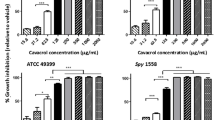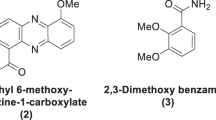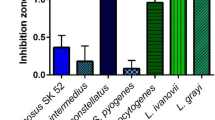Abstract
SABINE1 demonstrated the antibiotic-like effect of Lactobacillus acidophilus by growing it in a solid medium in holes cut in a plate seeded with a staphylococcus and Escherichia coli as test organisms. He stated that the inhibition observed was not a result of acidity, since there was no difference in the pH of the agar in the cup, in the inhibition zone or in the outer zone. The antibiotic substance was said to be extremely labile and had not yet been isolated.
This is a preview of subscription content, access via your institution
Access options
Subscribe to this journal
Receive 51 print issues and online access
$199.00 per year
only $3.90 per issue
Buy this article
- Purchase on Springer Link
- Instant access to full article PDF
Prices may be subject to local taxes which are calculated during checkout
Similar content being viewed by others
References
Sabine, D. B., Nature, 199, 811 (1963).
Ritter, P., Schweiz. Milchztg., 82, (17, Wissenschaft. Beilage No. 35), 273 (1956).
Shillinglaw, C. A., and Levine, M., Food Res., 8, 464 (1943).
Author information
Authors and Affiliations
Rights and permissions
About this article
Cite this article
TRAMER, J. Inhibitor Effect of Lactobacillus acidophilus. Nature 211, 204–205 (1966). https://doi.org/10.1038/211204a0
Issue Date:
DOI: https://doi.org/10.1038/211204a0
This article is cited by
-
Genetics of antagonistic action and drug resistance inLactobacillus acidophilus
World Journal of Microbiology and Biotechnology (1992)
-
The effect of fermentation on the growth and survival ofSalmonella typhimurium, Staphylococcus aureus, Bacillus cereus andPseudomonas aeruginosa in fermenting tef (Eragrostis tef)
MIRCEN Journal of Applied Microbiology and Biotechnology (1989)
Comments
By submitting a comment you agree to abide by our Terms and Community Guidelines. If you find something abusive or that does not comply with our terms or guidelines please flag it as inappropriate.



